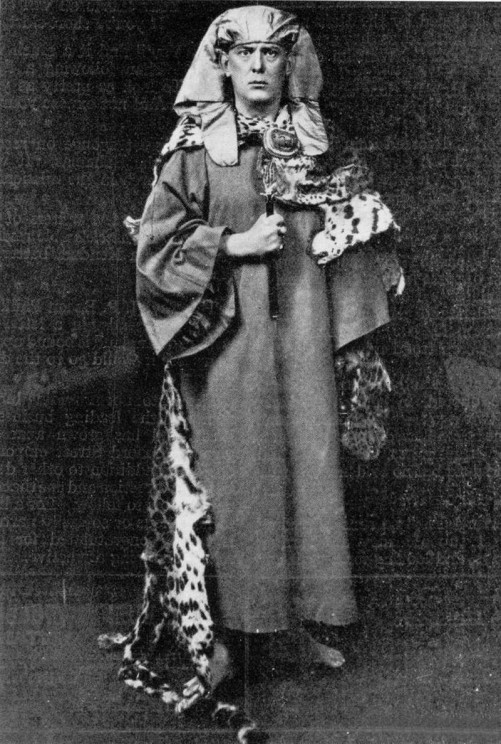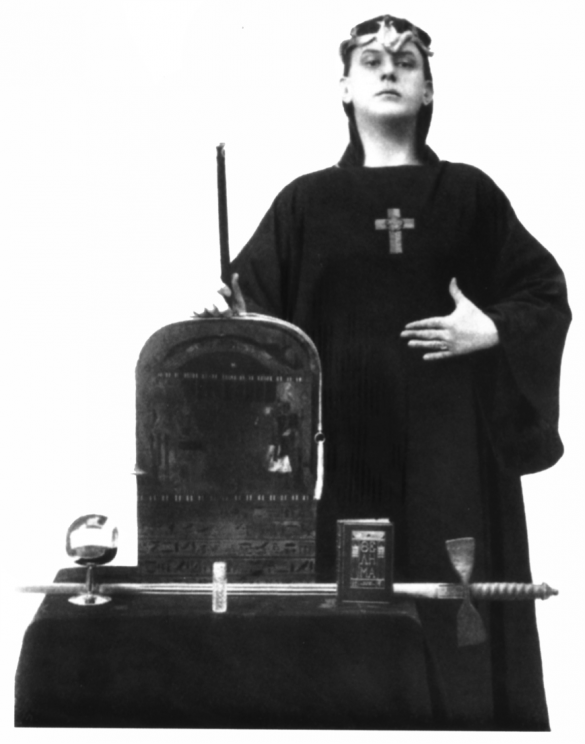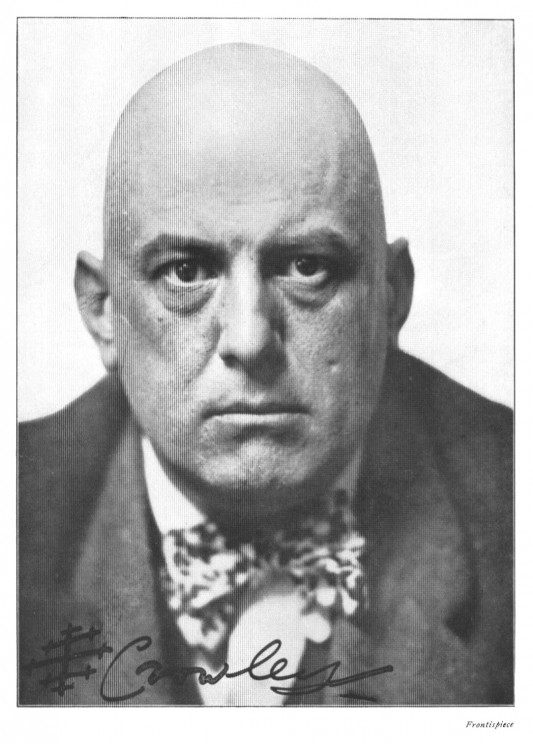By Alyssa Bender
The twelfth of August marks the Feast of the Prophet and his Bride, a holiday that commemorates the marriage of Aleister Crowley and his first wife Rose Edith Crowley in the religion he created, Thelema. Born in 1875, Crowley traveled the world, living in Cambridge, Mexico, Cairo, China, America, Sicily, and Berlin. Here, using Aleister Crowley and Western Esotericism as our trusted guide, we take a closer look at the man and his religion.
In 1898 Alesiter Crowley was initiated into the Hermetic Order of the Golden Dawn as Frater Perdurabo. The teachings of the Hermetic Order of the Golden Dawn were based upon an imaginative reworking of Hermetic writings further informed by nineteenth-century scholarship in Egyptology and anthropology. The order was structured around the symbolism of the kabbalah and organized into temples that were run on strictly hierarchical lines. Authority was vested in leading individuals, and initiates were given a rigorous and systematic training in the “rejected” knowledge of Western esotericism. They studied the symbolism of astrology, alchemy, and kabbalah; were instructed in geomantic and tarot divination; and learned the underpinnings of basic magical techniques.
Crowley’s magical self, Perdurabo, was a part of his concept of selfhood. In his own words:
As a member of the Second Order [of the Golden Dawn], I wore a certain jewelled ornament of gold upon my heart. I arranged that when I had it on, I was to permit no thought, word or action, save such as pertained directly to my magical aspirations. When I took it off I was, on the contrary, to permit no such things; I was to be utterly uninitiate. It was like Jekyll and Hyde, but with the two personalities balanced and complete in themselves.

The base camp of 1902 expedition for K2. Aleister Crowley is in setted in the middle. By Jules Jacot Guillarmod. Public domain via Wikimedia Commons.
In 1902, Aleister Crowley was a part of the team who made the second serious attempt to climb the world’s second highest summit, K2.
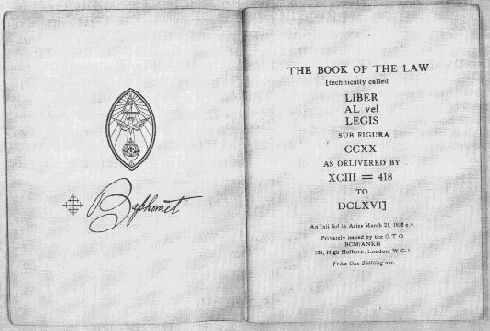
Frontpage from a published versions of Liber AL vel Legis. By Ordo Templi Orientis. Public domain via Wikimedia Commons.
In the spring of 1904, while on his honeymoon in Cairo, Egypt, he received a short prophetic text, which came to be known as Liber AL vel Legis or The Book of the Law. The book announces the doctrines of a new religion called Thelema, with Crowley—referred to in the book as “the prince-priest the Beast”—as its prophet.
The most important book of The Holy Books of Thelema, The Book of the Law is a channeled text that consists of 220 short verses divided into three chapters.
The core doctrines of this new creed of Thelema were expressed in three short dictums: “Do what thou wilt shall be the whole of the Law,” “Love is the law, love under will,” and “Every man and every woman is a star.”

Thelema Abbey in Cefalù, Sicily, by Frater Kybernetes. CC BY-SA 2.0 via Wikimedia Commons.
Thelema Abbey was established in the small Italian town of Cefalù in the period between 1920 and 1923. It consisted of one large house occupied by a small number of Crowley’s disciples and mistress(es). Life at the Abbey was for the most part Crowley’s attempt to translate his magical and Thelemic ideas into social reality. For the participants, the regime of life involved a great deal of occult and sex-magic activity as well as experiments with various mind-and mood-altering substances, such as hashish, cocaine, heroin, and opium.
Alyssa Bender is a marketing coordinator in Academic/Trade marketing, working on religion and theology titles as well as Bibles. She has worked in OUP’s New York office since July 2011.
Aleister Crowley and Western Esotericism, edited by Henrik Bogdan and Martin P. Starr, is the first comprehensive examination of an understudied thinker and figure in the occult.
Subscribe to the OUPblog via email or RSS.
Subscribe to only religion articles on the OUPblog via email or RSS.
The post Aleister Crowley and Thelema appeared first on OUPblog.

Elvin Lim is Assistant Professor of Government at Wesleyan University and  author of The Anti-intellectual Presidency, which draws on interviews with more than 40 presidential speechwriters to investigate this relentless qualitative decline, over the course of 200 years, in our presidents’ ability to communicate with the public. He also blogs at www.elvinlim.com. In the article below he looks at what happens when you judge too quickly. See his previous OUPblogs here.
author of The Anti-intellectual Presidency, which draws on interviews with more than 40 presidential speechwriters to investigate this relentless qualitative decline, over the course of 200 years, in our presidents’ ability to communicate with the public. He also blogs at www.elvinlim.com. In the article below he looks at what happens when you judge too quickly. See his previous OUPblogs here.
In his press conference on July 22, President Obama’s knee-jerk reaction to call what the Cambridge police department did “stupid” was poor form. The president thought he was avoiding the hot spot when asked about the Gates arrest by saying that the controversy offered a “teachable moment.” But having admitted that he had imperfect knowledge of the facts, he went on and assumed that this particular incident invited a lesson about racial profiling and made the very indictment that his conversational segway was intended to avoid. In so doing, Obama confirmed conservatives’ belief that minorities love to whine about their beleaguered status (also another knee-jerk belief, incidentally) even if Obama could have made a case had he marshalled the evidence appropriately. Obama spoke like a liberal before he thought, and that was his mistake.
In so doing, he repeated the same mistake that Professor Gates made. Like Obama, Gates, too, jumped to the conclusion that Sgt Crowley was racist. I do not know if Sgt Crowley acted hastily in arresting the Professor for allegedly exhibiting “tumultous” behavior, so I won’t jump to conclusions but simply note my suspicion that there was probably a contest of egos on both sides. Those who have rushed to Crowley’s defense should ask themselves if they do not also have a knee-jerk reaction to give the benefit of the doubt to a law enforcement officer (or a soldier or a partisan affiliated with the Commander-in-Chief.)
Gates, Obama, and possibly Crowley were not the only people who have been jumping to conclusions, substituting unreflected intuition for a careful weighing of the evidence. Frank Luntz and his political students are encouraging Americans to become thoughtless automatons responding to carefully researched code words like “government takeover” and “health-care rationing.” The issue domain is different, but the error is the same.
It is very difficult to prove racial-profiling, for it demands an investigator to go inside the head of the alleged perpetrator. It is equally difficult to prove that the president’s and Democratic Congress’s plan for a “public option” is a precursor to a completely government-run health-care system. If it is not appropriate to rush to accuse someone of being racist, then it is at least premature to rush to accuse of someone of being socialist (assuming that that is a bad thing).
Those who are accusing Obama and Gates for rushing into judgment should look into the mirror to see if they too have not rushed to conclude that liberals are whiners and socialists who want a government takeover of health-care. At some level, we all have the instinct to cherry-pick the evidence to come to the conclusions we want.
Ideologies, like stereotypes, are cognitive cues or heuristics. They help us to “think” before we get the facts. They allow us to abdicate our duty to make sense of the world with our own independent judgment. They do the easy but intellectually dishonest work of guiding our reactions to the conclusions we want without us having to do the hard work of getting to know a person or a proposed policy before we came to a judgment. The people who are reinforcing such behavior in our politics are destroying our democracy and robbing us of our first freedom - the freedom of independent thought.
So the Gates controversy is a teaching moment, and the lesson is quite simple. Look before you leap; think before you conclude. It is probably the first lesson of critical thinking, but two professors forgot it last week. If Obama wants us to learn this lesson, he should have been clearer about what the nature of his lapse was. It wasn’t that the president miscallibrated his words - for the question wasn’t about the intensity of what he said, but the very fact that he said something at all. Obama should have apologized for expressing what he felt and intuited without having first perused the evidence. If he had done that, he would have claimed the moral ground to shame some of his opponents in Congress into admitting that they too are doing the same thing in their knee-jerk opposition to what they call “Obamacare.”


By Edward Zelinsky
At their much anticipated White House meeting held last Thursday night over beer, President Obama, Professor Henry Louis Gates Jr. and Sergeant James Crowley made a valiant effort to end the national controversy provoked by Sgt. Crowley’s arrest of Prof. Gates. However, these White House atmospherics, while well intended, cannot obscure the troubling questions which persist: Was there probable cause for Sgt. Crowley to conclude that disorderly conduct had occurred? If not, was the arrest, as President Obama initially opined, “stupid”? Of the irreconcilable statements advanced by Prof. Gates and Sgt. Crowley, which is true – and which is false?
Throughout the twentieth century, judges and legal scholars have grappled with the dilemma posed by the notion of disorderly conduct. On the one hand, individuals can behave in ways which unacceptably disrupt other persons and the community as a whole. On the other hand, the term “disorderly conduct,” by itself, is disorderly. This term is vague, giving no effective notice of what conduct is forbidden. Consequently, arresting officers may have great discretion to deem conduct as “disorderly.” In the worst case scenarios, constitutionally-protected expression and purely private behavior can be squelched as “disorderly.”
The drafters of the Model Penal Code (MPC) addressed this dilemma by limiting the concept of “disorderly conduct” to situations in which an individual deliberately or recklessly “cause(s) public inconvenience, annoyance or alarm.” From this perspective, there is no crime of disorderly conduct in private. Moreover, conduct is illegally disorderly only if an individual intentionally or recklessly inconveniences, annoys or alarms the public. In such decisions as Commonwealth v. Peace Chou, the Supreme Judicial Court of Massachusetts incorporated the MPC definition of “disorderly conduct” into Massachusetts law.
In light of this legal definition, Sgt. Crowley lacked probable cause to arrest Prof. Gates for disorderly conduct under either Sgt. Crowley’s description of events or Prof. Gates’. According to Prof. Gates’ narrative, he was arrested as he stepped onto his porch, before he made any public comments. As a legal matter, there is no disorderly conduct in Massachusetts without public impact.
Assuming instead the truth of Sgt. Crowley’s report, he still lacked probable cause to arrest Prof. Gates for disorderly conduct. Nothing in the police report suggests that Prof. Gates intended to inconvenience, annoy or alarm his neighbors or that his behavior, as described by Sgt. Crowley, satisfied the test of recklessness.
That, however, is not the end of the story.
President Obama in his July 22nd press conference called the arrest of Prof. Gates “stupid,” a term which implies that Sgt. Crowley acted irrationally, in bad faith, or both. Again, accepting Sgt. Crowley’s description of the events of that night, his decision to arrest Prof. Gates, while legally incorrect, was not “stupid” since, in Sgt. Crowley’s telling of the story, Prof. Gates’ behavior was abusive and intemperate. From this vantage, the arrest, while faulty, was understandable.
In contrast, accepting Prof. Gates’ statement as the correct version of events, what occurred that night was far worse than “stupid.” The narrative released by Prof. Gates describes him as calmly identifying himself to Sgt. Crowley as the occupant of his home. The Gates narrative then depicts Sgt. Crowley, without provocation or reason, arresting Prof. Gates for disorderly conduct when Prof. Gates stepped onto his porch, before Prof. Gates engaged in any public statements.
Each of these gentlemen, as well as the President, had his own reasons for participating in Thursday night’s brewski diplomacy. Nevertheless, these troubling questions persist. The carefully-crafted Gates and Crowley statements cannot be reconciled. In the former version, the arrest that night in Cambridge was totally unjustified. In the latter version, the arrest was understandable, albeit legally insufficient. Either way, President Obama’s initial characterization of the arrest as “stupid” was wrong, either unfair to Sgt. Crowley or too generous to him.
We should not mistake a feel good event with an authoritative resolution. Suds should not be confused with substance.
Edward A. Zelinsky 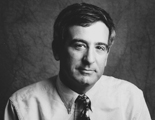
is the Morris and Annie Trachman Professor of Law at the
Benjamin N. Cardozo School of Law of Yeshiva University. He is the author of
The Origins of the Ownership Society: How The Defined Contribution Paradigm Changed America.

